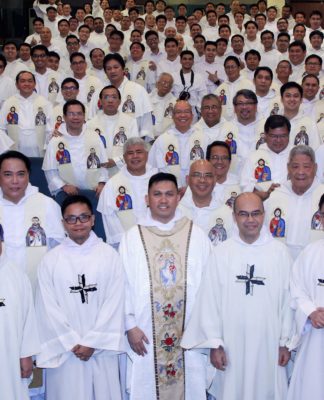MOST decades in the Varsitarian’s history saw the young staffers expressing their thoughts and sentiments through their articles, energized as their pens were by journalistic freedom.
But the Varsitarian staffers of the 70’s could only write under the black cloud of martial law.
“(We were) always pushing the boundary. (We tried) to write more commentaries (about) national affairs. But still, we didn’t write so much about politics because the administration wanted some restriction,” said Rina Jimenez-David, Philippine Daily Inquirer columnist and Varsitarian editor in chief in 1975.
She also said that it was really the climate of suppression fostered by martial rule which made them concentrate on campus issues. She said they were allowed to tackle only student-related topics through in-depth articles in the Special Reports section.
“That page (Special Reports) would always be about campus issues such as student budgets, the state of the university and new services for the students,” Jimenez-David said.
Student activism had peaked in the pre-martial law years. Press freedom had been the major battlecry of campus writers, within and outside UST.
“The Varsitarian was relatively toned down by martial law. It was a tightrope situation to the extent that we had to follow the national temperament,” said Nestor Cuartero, ‘V’ managing editor in the 70’s and now entertainment editor of Tempo and a lecturer at the Faculty of Arts and Letters.
Because of the repressive environment, student writers were challenged to be more inventive and creative so as to convey the subtle political messages. Poetry and other compositions became satirical in nature.
Cuartero related how, in fighting for press freedom and censorship, the staffers became closer to one another in the process. They would hang out together to cope with the stress of presswork.
“It’s the camaraderie. And that’s one thing which I think has not changed. The family spirit in the Varsitarian is transcendental,” Cuartero said.
Trials and joys
The Varsitarian in the 70’s had trials other than martial law. The trials started as early as 1970, when 21 ‘V’ staffers were expelled because of a controversial lampoon issue, wherein a photo caption allegedly maligned Pope Paul VI during his historic visit to the Philippines. The caption, published in The Vuisitarian, the ‘V’s lampoon, reported about the Pope, supposedly having an organ transplant while visiting the country.
The 70’s also saw student-activists being barred from trying out for the publication. As student organizations were abolished during the martial law era, the Varsitarian reported on attempts to resurrect them.
Nevertheless, the ‘V’ staffers were able to find ways to alleviate the stress brought about by the times. Summer staff outings and seminar workshops were something that the 70’s decade started.
“Ang saya noon. We used to go to Maalikaya Beach in Batangas. That was a once-a-year culminating activity that evolved into other levels through the years. Kaya ang lungkot kapag naghihiwalay na,” Cuartero added.
The tense political atmosphere contributed to reforms in student journalism. According to former associate editor Marian Regina Martin-Layug, the 70’s slowly marked the development of investigative journalism, though martial law adversely affected their lives as campus journalists as well.
“We might have made a bigger impact on journalism in general if martial law had not taken place during our formative years in the Varsitarian. Instead (of journalism), we went into advertising, marketing, and other related fields,” she said.
So it was no surprise that after martial law was lifted, a lot of the Journalism graduates went back to writing, this time with a vengeance. Many of the Varsitarian and other UST alumni in fact became the leading lights of the alternative press such as Jose Burgos, Jr., Felix Bautista, Eugenia Apostol, Alice Villadolid and Jimenez.
The Varsitarian’s encounter with martial law indeed yielded a lot of controversies and issues. But it instilled discipline, creativity and keenness of perspective among staff members. Above all, it fostered camaraderie that continues up to now, when the staffers have become leading names in the media. Joanne G. Fajardo














